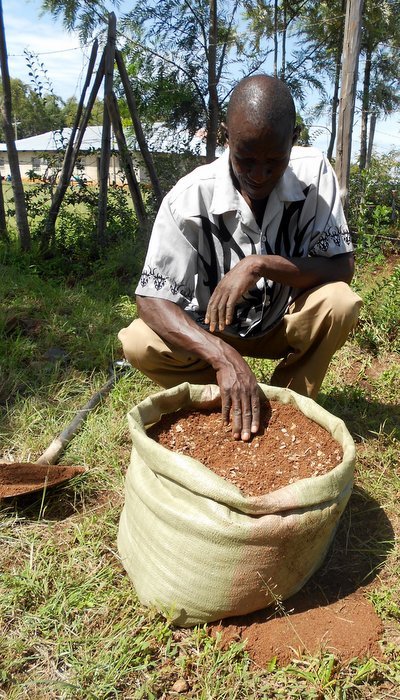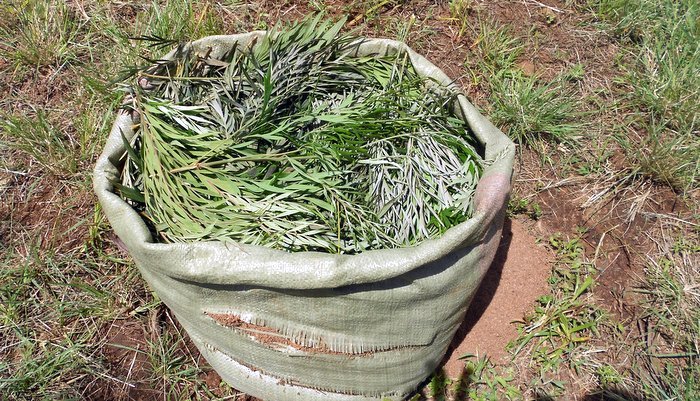Nuru Kenya’s Agriculture Program is offering a diversified loan package in 2014, including a robust mix of crops including maize, brown sorghum and millet. This recent blog posting from Amy Sherwood lists the benefits of the crops package in contributing to nutrition, food security, and resilient rural livelihoods of farmers in extreme poverty in Kuria West, Kenya. As a tropical forester, I wanted to share my excitement about one particular part of the loan package: grevillea trees.
Grevillea (Grevillea robusta) tree seeds are being provided to farmers in 10 gram sachets as part of the standard loan package. Considering the thousands of farmers projected to take loans in 2014, this will translate to hundreds of thousands of trees planted.
Grevillea trees are fast-growing, highly marketable, hardy and demanded by Nuru Kenya farmers for their multiple uses. In Kenya, grevillea is used for sawtimber, firewood, poles, in agroforestry applications, as fodder and bedding for livestock, and as shade for tea and coffee. Grevillea has deep roots and tolerates heavy pruning and pollarding, meaning it doesn’t compete for water, nutrients or sunlight with surrounding crops. It is easily propagated from seed and grows well even without fertilizer and in soil prepared by hand implements, meaning farmers can plant it without great cost or labor. Farmers in Kenya typically plant grevillea around their homes, to demarcate fields, as wind breaks between fields, as single trees, and in small woodlots.
 The trees are being offered at very low cost and on loan. This provides farmers flexibility in payment. It also means that since farmers are paying to produce trees, they will have the incentive to care for these trees. In my years of forestry work, I’ve seen my share of reforestation projects where trees are donated on a handout basis, with little involvement from the community, little care taken during planting to the field and no follow-up protection from fires, pests or rotational agriculturalists. The results are mixed at best, because forest sites are funded as six month projects instead of for the 15, 20 or 30 years (or far longer) that trees in the tropics take to grow to maturity. The beauty of Nuru Kenya’s Agriculture agroforestry initiative is that it is farmer-funded and farmer-driven, so they have the incentive and resources to pay for and care for trees over their lifetime.
The trees are being offered at very low cost and on loan. This provides farmers flexibility in payment. It also means that since farmers are paying to produce trees, they will have the incentive to care for these trees. In my years of forestry work, I’ve seen my share of reforestation projects where trees are donated on a handout basis, with little involvement from the community, little care taken during planting to the field and no follow-up protection from fires, pests or rotational agriculturalists. The results are mixed at best, because forest sites are funded as six month projects instead of for the 15, 20 or 30 years (or far longer) that trees in the tropics take to grow to maturity. The beauty of Nuru Kenya’s Agriculture agroforestry initiative is that it is farmer-funded and farmer-driven, so they have the incentive and resources to pay for and care for trees over their lifetime.
Grevillea trees are accompanied with the materials farmers need to make nursery beds and a full training plan. Farmers will receive instruction on how to raise seedlings in the nursery bed, protect them until they are established, and how to take the seedlings and plant them in the field. Farmers will then be provided instruction on how to care for the young trees and best raise them to maturity.
 Tree plantations fit into the overarching Nuru Kenya Agriculture Program goal based on criteria of impact, sustainability and scalability.
Tree plantations fit into the overarching Nuru Kenya Agriculture Program goal based on criteria of impact, sustainability and scalability.
- Impact:
- Trees provide for long-term economic sustainability in chronic hunger communities where the economic returns from poles or timber after 10 to 15 years is competitive with many agricultural crops over this same amount of time and land.
- Trees also produce branches for firewood on an on-going basis, which can be sold or otherwise offset the need to purchase firewood.
- Sustainability (environmental):
- Trees provide ecological services (erosion control, water penetration, wind breaks, carbon uptake) that contribute to environmental sustainability and financial productivity of program interventions.
- Reforestation in Kuria helps restore the forests and reverses decades of deforestation that came as a result of tobacco farming and curing.
- Sustainability (financial):
- Trees are a financially sustainable program intervention as the initial cost of a tree plantation is minimal and repaid by the farmer upon harvesting their annual crops.
- Scalability
- Trees are a highly scalable program intervention as farmers already have a moderate amount of knowledge and a high demand of tree planting. They are very willing and able to take on further training to plant and maintain small plantations.
- The cost of time and resources to Nuru Kenya is minimal, as the same Agriculture Field Officers are providing the training, the training agenda was generously shared by One Acre Fund, and the capital costs of bulk purchasing tree seeds is very low.
In sum, planting of grevillea trees will bring thousands of farmers in Kuria West to perceive the financial and environmental benefits of productive forestry.

